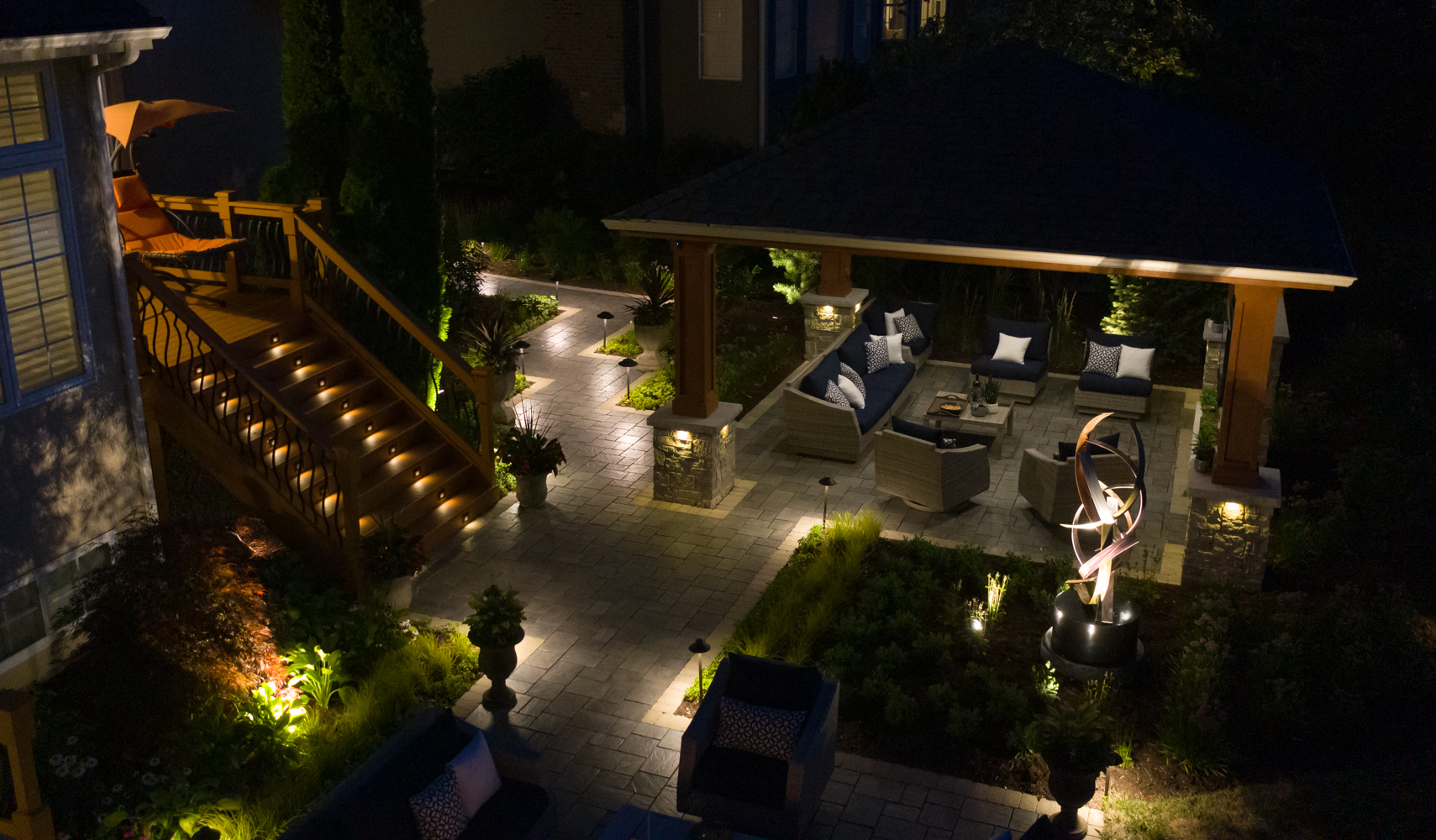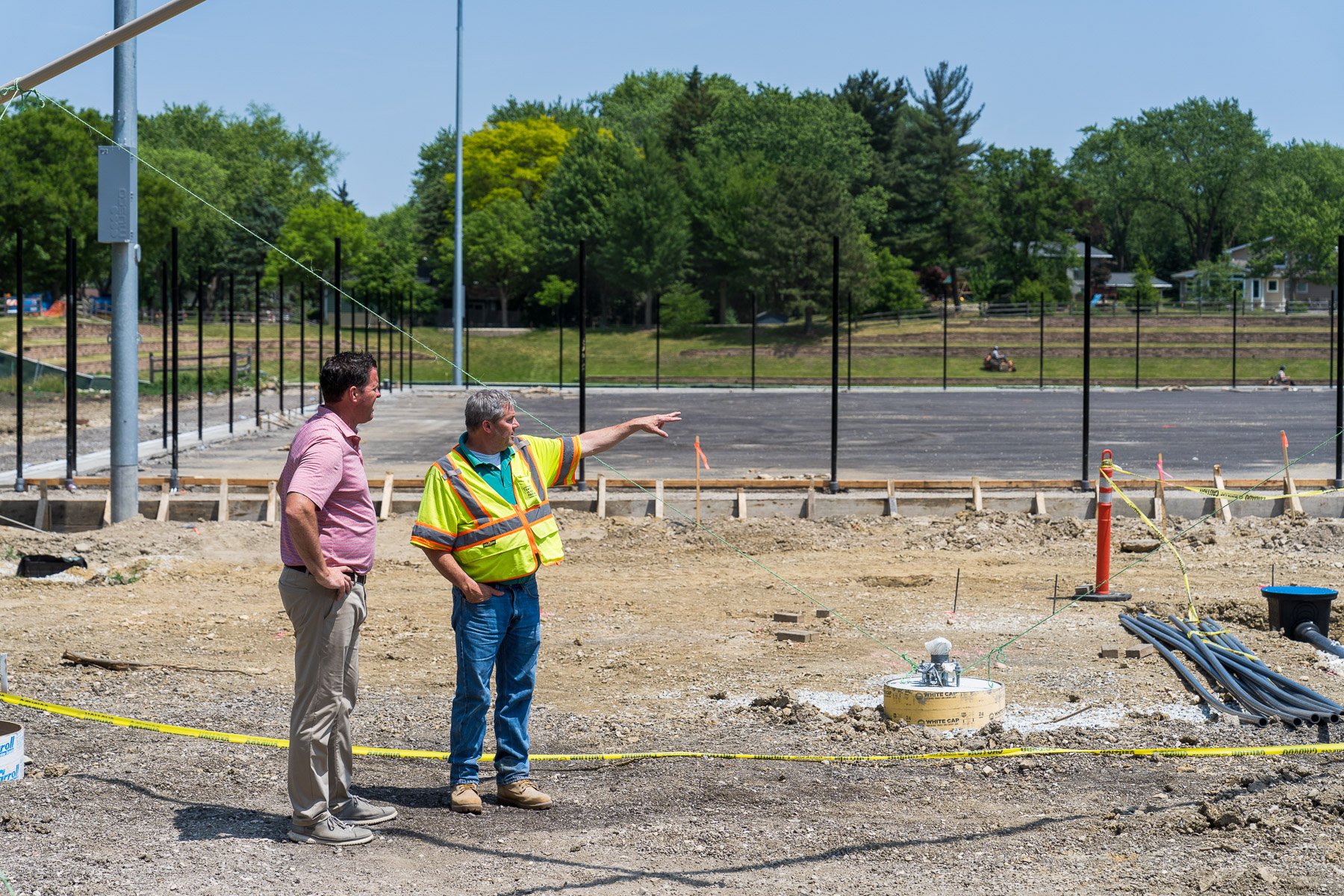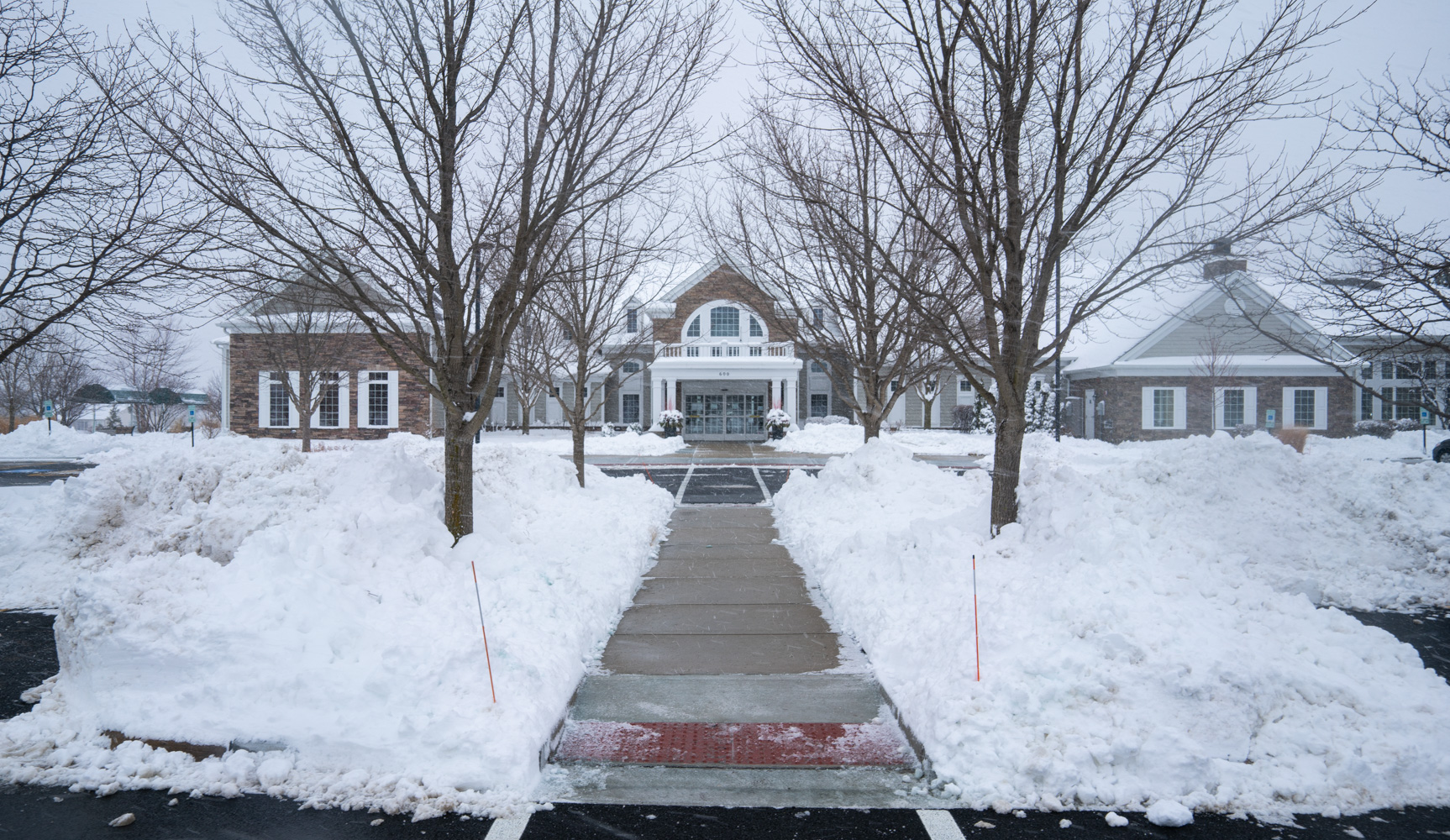Managing and maintaining the commercial grounds on an industrial property or warehouse in Greater Chicago can be a daunting experience for any facility manager.
You have to keep the indoor areas in tact amidst the constant comings and goings of vehicle and foot traffic. You also have to ensure your property looks attractive and professional to maintain your business image and reputation in the local community.
But when it comes to your landscaping and lawn care, knowing exactly what to do to improve your property appearance and keep plants and trees healthy so they continue working positively for your property can be challenging. How and where can you add the right plants that work for your site’s specific and challenging conditions? What will attract people to your site versus deter them? On top of that, you have to keep liability concerns to a minimum, which means keeping walkways maintained, snow and ice cleared, and dead or weak tree branches trimmed to avoid trips, falls, or accidents.
After all, an exterior that is not cared for or a property that lacks any real landscape design can send warning messages to tenants and visitors that say, “Stay away.” And that’s not the image you want to project. Overgrown plants, a lawn full of weeds, no color, and a general lack of consideration for the outdoor appearance can make anyone passing by stear clear.
In this guide, we’ll review some common strategies for Greater Chicago industrial property landscaping and warehouse landscaping that can take these properties to the next level and ensure a professional, positive, aesthetically pleasing image, as well as a safe and secure site that draws people in and encourages them to stay awhile.
Table of Contents
- The Importance of Professional Landscaping for Industrial Facilities and Warehouses
- Designing a Custom Commercial Landscape for Your Chicago Industrial Facility
- Seasonal Maintenance for Industrial Landscaping in Chicago
- Common Landscaping Challenges for Industrial Facilities
- Things to Look For Before Signing an Industrial Property Landscaping Contract
- Choosing the Right Commercial Landscaping Company in Chicago
The Importance of Professional Landscaping for Industrial Facilities and Warehouses
Industrial landscape maintenance in Greater Chicago isn’t easy. Staying on top of growing trees, shrubs, and plants can be time-consuming, and you have to do these tasks correctly to ensure you keep your landscape assets healthy, along with continuing to elevate your curb appeal and business reputation.
This is where bringing a professional commercial landscape business can make a world of difference, reducing headaches and unnecessary repair costs, while boosting aesthetics.
Some of the key reasons the professional treatment makes a difference in your industrial facility and warehouse landscaping include:
- You create a more welcoming and functioning environment for employees, including increasing spots workers can use daily to enhance their work environment.
- You can boost curb appeal with a property that projects a good first impression and is inviting, giving your business the impression that it cares about its work and the people it employs and does business with.
- You enhance safety by increasing visibility, keeping lighting working and signage clear, managing drainage and standing water, deterring criminals or thieves, and reducing liability issues. What’s more, a secure property makes people feel safe and welcome.
- You increase sustainability by better managing stormwater, mitigating erosion, improving plant health, and even cutting down on maintenance costs with these initiatives.
Designing a Custom Commercial Landscape for Your Chicago Industrial Facility
Just because your industrial facility is a busy place full of employee arrivals and departures, as well as deliveries and visitors, doesn’t mean it can’t look well-maintained with a landscape that welcomes people in and presents a positive and professional first impression.
Industrial sites benefit from landscape installation to enhance their appearance and even provide functional and useful spaces for employees and visitors.
Let’s talk about the best industrial property landscaping ideas for your facility or warehouse.
- Choose the right plants and materials for your specific environment. An industrial property or warehouse space typically has a lot more concrete. This means they need plants that are hardy and drought-tolerant. This also includes choosing plants that can handle salt if they are located near walkways. Some great options are ornamental grasses; deciduous shrubs like burning bush, oak leaf hydrangea, viburnum, and spirea; and evergreen shrubs like boxwood, juniper, holly, and rhododendron.
- Focus budget dollars on high-impact locations, such as entryways. Creative, colorful plant displays can highlight signage and create the right attention on highly visible areas.
- Remember to drive function in landscape design improvements. Things like rain gardens to properly working detention ponds can help filter water runoff and ease drainage issues, as well as increase eye-pleasing views.
Seasonal Maintenance for Industrial Landscaping in Chicago
Your job as a facility manager is to keep your Industrial property landscaping looking sharp each and every month, and certainly some months can be easier than others.
Managing each month of commercial landscaping at an industrial facility or warehouse space takes preparation and planning. These are some important maintenance tasks to remember to include in your plan.
- Spring cleaning and prepping for summer. Spring cleanup involves landscape bed preparation. This includes edging the plant beds and applying a pre-emergent herbicide application to tackle weeds that are best controlled before they burst through your soil. A mulch application of roughly 2 inches of double-shredded hardwood mulch can also suppress weeds, keep your soil temperature even and moist, and improve your soil, as well as add additional polish to your landscape. Adding annuals for seasonal color can also start in spring, blending with your bulbs for early color.
- Manage weeds. In addition to pre-emergent herbicide applications to grab weeds that emerge early, you want to ensure you receive post-emergent herbicide applications to tackle stubborn weeds that escaped pre-emergent control or broke through on bare lawn areas.
- Keep your irrigation system working properly. This means adjusting your irrigation system so it’s working well, making regular repairs, receiving regular audits, and shutting down your system in winter to ensure long life.
- Keep your detention ponds maintained and working well. You want to clear blockages, limit critter damage, and prevent erosion with shoreline stabilization. This ensures your detention pond looks good and does its job.
- Stay ahead of snow and ice. Make sure you have a snow and ice removal contract in place prior to winter months in Greater Chicago as part of your industrial landscaping maintenance. You don’t want to encounter a rough snowstorm and not have the support you need to clear that snow and ice from your property promptly.
Common Landscaping Challenges for Industrial Facilities
Industrial facility landscaping can take a beating just by the sheer nature of the busy environment on a vast expanse of land that includes a lot of concrete.
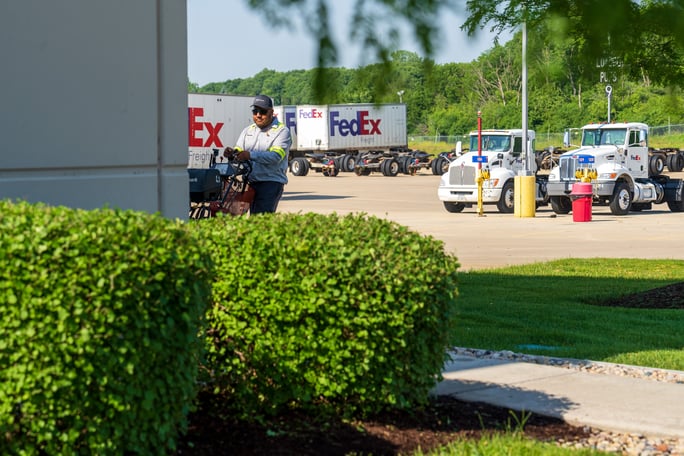
As such, there are always challenges to overcome. Staying ahead of these common issues can save you time and money, as well as keep your property functioning and looking great.
- Standing water. Not only can frequent standing water signal a nearby drainage problem, but water that stands for even only a few days can lead to increased mosquito populations. standing water can start small and lead to larger problems if ignored. It can take some proper grading to fix the problem or manage the water flow. Other times, french drains, rain gardens or detention ponds can create a more permanent solution to a spot that tends to over-collect water.
- Erosion. If there is a hilly spot that isn’t graded properly or a retaining wall wasn’t built properly or a detention pond isn’t maintained, then mud and debris will continue to move downward and leak onto walkways, creating issues. The solution to this industrial properly landscaping issue is to evaluate the cause of the issue and fix it before it becomes a bigger, costlier problem.
- Overgrown plants. Trees and shrubs on your industrial facility that are left to grow wild can get unwieldy, leading to safety hazards and visibility issues. The solution to this challenge is to prune trees and shrubs twice annually: early summer and fall. Additionally, dormant pruning, which is pruning during the winter, can be less stressful on trees and ensure healthier plants.
- Hardscape issues. When concrete or hardscapes buckle or roots grow and disrupt walkways, uneven ground can result. This can lead to a liability issue for industrial facilities. To fix this, assess the issue and decide what fix would be best long-term. For example, grading the soil, removing a tree that has impeding roots, or repairing hardscapes can be potential fixes for these situations.
- Compacted turf. Compacted turf can cause everything from brown spots to weeds. Annual aeration and overseeding in the fall can help prevent compacted turf, keeping it healthy.
- Trash and debris. Trash pickup may seem like a simple one but, if left neglected for even a small amount of time, trash can pile up on industrial property landscaping. Stay ahead of this one by including trash pickup and spring and fall cleanups in your commercial maintenance package.
Things to Look For Before Signing an Industrial Property Landscaping Contract
Has your Industrial landscape maintenance service provider underperformed? Do you feel ignored or that you don’t receive great communication? Maybe you notice improvements you need, but you don’t have time to micromanage them. Maybe you wish these issues were already addressed.
This means it might be time to reassess your relationship or find a new industrial site or warehouse landscaping partner. You certainly don’t want to let your employees, property visitors, and customers down.
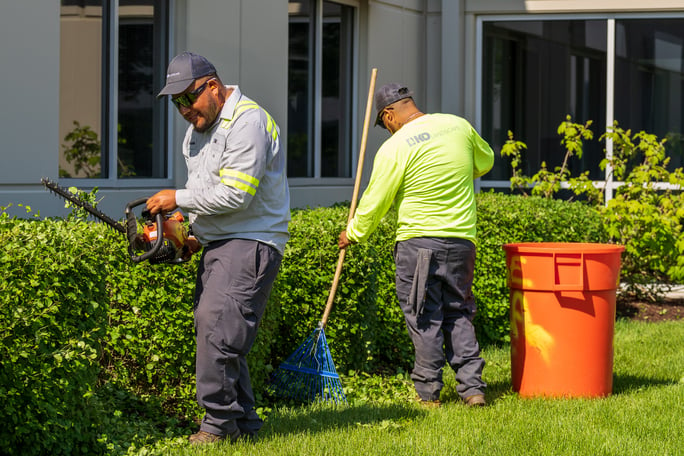
Finding the right partner takes asking the right questions, so you can compare apples to apples and pick a Greater Chicago company you feel confident in. Focus on these areas as you target your search.
- The right services for your site. Professional, experienced commercial landscaping in Greater Chicago will know industrial landscape standards and be able to suggest improvements to your property to maximize your space. Ask about their experience working with sites like yours.
- Service frequency and specifics. To be able to understand how a commercial landscape contractor would work on your property and compare services from one company to the next, you must get a full understanding of the services they offer, how often crews are at your facility, and how they work. That’s why during your questioning, your potential service provider should be transparent and open about what services they provide, how they conduct business, and what strategies they use for specialty services.
- Solid references. Nothing expresses how a customer feels about their industrial landscaping maintenance services more than their willingness to share their positive experience. Service providers with expertise providing industrial and warehouse landscaping in Greater Chicago will have case studies detailing their work that they can share with you.
- The importance of safety. An industrial facility must maintain safety at all times. Regularly trimming trees and shrubs so they aren’t a hazard, as well as taking care of any drainage or water issues, are some examples of things you need your service provider to include in weekly maintenance work. This need for safety also extends to the people visiting your site. You don’t want slips and falls when walking in and out of your facility. A commercial landscape company that keeps this in mind will clean off debris after they mow sections to avoid any hazardous walkways before moving on. It’s a common courtesy that makes their service extra special. This includes not just crew member behavior but also the general appearance of company vehicles and employees, since they are a representation of your brand while working on your commercial property. Employees should also be wearing the proper safety gear and personal protective equipment.
- Clear and consistent communication. Brief monthly meetings, in addition to quarterly or at least biannual meetings for review and redirection, help maintain an ongoing dialogue to ensure your needs are being met. You should be comfortable with the amount of communication you receive from your commercial service provider, as well as the reporting on services provided. This relationship-building and communication builds trust.
- Budget concerns. When discussing questions to ask a commercial landscaper, your landscape professional should be completely transparent about costs involved and what’s included versus what might be considered additional services or enhancements. They should also be willing to discuss your budget needs and challenges – not only during contract signing, but also mid-year or anytime you need to discuss it.
Choosing the Right Commercial Landscaping Company for Your Industrial Facility in Chicago
As you compare the top landscaping services for industrial facilities in Chicago, we hope you’ll consider KD Landscape in your search. Our focus on experience and expertise in industrial property landscaping, our customized service and attention to detail, and our deep knowledge of Chicago’s unique environment makes us an ideal partner.
These differentiators set us apart from the competition.
- Our Employees. Advancement from within is a major focus of our core employment philosophy. That means the people in our management positions have all worked their way up from field crew members. Most of our managers are also landscape industry certified. We firmly believe that when we take care of our commercial landscaping company team members, they take better care of our customers.
- We Believe in Continuous Improvement. We believe maintaining employee training elevates our quality control and customer service, which we feel is important in every single industrial landscaping company job. In training, we discuss best practices, seasonal changes and tips, and safety reminders. Our account managers and field supervisors are also out in the field all day checking on crews and jobs, as well as critiquing and teaching service techniques.
- Customer Communication is a Key Part of Our Service. Communication is something industrial facility managers appreciate. You don’t want to have to guess what was done or what’s going on or if something will be done on your property. That’s why you are hiring a professional to help you. At KD Landscape, we appreciate consistent and regular communication, too. This doesn't always mean we can solve your problem in 24 hours, but we will contact you and let you know we’re aware of your question or issue and that we’re working on it.
We hope this industrial property landscaping guide helps you better care for your Greater Chicago property. If you’re seeking a service provider, we’d love to help you and learn more about your facility. Get started today with a free quote. We’ll review your options together so you can feel confident and make a great choice.



